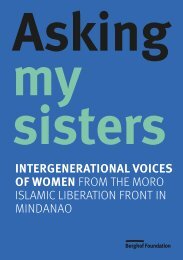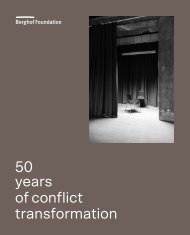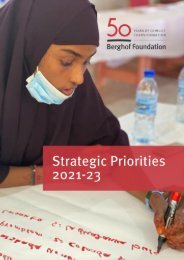Strategic Priorities 2022-2025
In order to adopt to a digitalised world, a planet facing ecocide through climate change and further global challenges, the Berghof Foundation as an organisation has to evolve as well. We are therefore expanding our activities beyond our established focal areas into six additional areas of strategic importance. How Berghof intends to go about it over the next four years is the subject of this document.
In order to adopt to a digitalised world, a planet facing ecocide through climate change and further global challenges, the Berghof Foundation as an organisation has to evolve as well. We are therefore expanding our activities beyond our established focal areas into six additional areas of strategic importance. How Berghof intends to go about it over the next four years is the subject of this document.
You also want an ePaper? Increase the reach of your titles
YUMPU automatically turns print PDFs into web optimized ePapers that Google loves.
Foreword<br />
In October 2021, the Berghof Foundation celebrated its 50 th anniversary in Berlin. Founded in a<br />
divided country and continent at the height of the Cold War, Berghof’s purpose was to reduce<br />
sources of tension and improve dialogue.<br />
To commemorate the occasion, we published a book entitled 50 years of Conflict<br />
Transformation. It is available online, and I would especially commend<br />
the interview with Johannes Zundel, the son of our founder, who provides the background<br />
and an overview of Berghof’s history.<br />
Though the last half-century has witnessed vast changes in every aspect of life, including the<br />
nature of threats to peace and also in the ways Berghof carries out its work in many parts of the<br />
world, our organisation’s overall purpose of conflict transformation remains the same.<br />
Over the years, Berghof has built up a truly unique combination of activities and expertise – i)<br />
operational peace support in all its forms, ii) peace education and learning, and iii) conflict<br />
research. Each of these areas complements and contributes to our work in other areas.<br />
Berghof has worked to adapt to a digitalised world in which mass disinformation and hate speech<br />
have become hallmarks; to a planet facing ecocide through climate change and pollution; to the<br />
uncertainties brought about by the COVID-19 pandemic; and to dramatic changes in the status<br />
and postures of the world superpowers.<br />
During its five decades of intensive work, Berghof has built up a solid reputation in two broad<br />
areas. The first is its intellectual and practical competence; the second is the ethical<br />
underpinnings that lie behind its work. For Berghof staff, peace has always signified much more<br />
than the absence of violent conflict, and this is why such emphasis is placed on dealing<br />
systematically with the complex structural or root causes of conflict in all their forms.<br />
Working on a number of mediation and peace peacebuilding tracks, Berghof constantly analyses<br />
evolving conditions in the countries and regions where it operates. And then it puts its ideas into<br />
effect using a wide variety of approaches and techniques, including grassroots reconciliation and<br />
peace education, participatory research and policy reviews, and high-level dialogue and<br />
mediation support. The aim is to tackle the underlying causes of conflicts – human rights<br />
violations, exclusion and discrimination, as well as manipulation of historical narratives –<br />
thereby reducing tensions and transforming conflicts.<br />
During the coming years, Berghof has decided – without diminishing the work and expertise<br />
built up in its traditional core topics – to focus on six additional thematic areas: i) Climate change<br />
and conflict transformation; ii) Engaging with protest movements to strengthen non-violent<br />
strategies; iii) Inclusive governance and accountability to mitigate corruption and other<br />
economic drivers of conflict; iv) Digital revolution and its impact on our work; v) Dealing with<br />
the past in conflict transformation; vi) The role of women and gender in conflict transformation<br />
and mediation.<br />
Our analysis of global trends leads us to believe that the work of mediation and peacebuilding<br />
organisations – including Berghof and our sister institutions, with many of whom we are<br />
Page 2 | 13










